Home Tags Posts tagged with "Mass surveillance"
Mass surveillance
Wikimedia Foundation has filed a lawsuit against the National Security Agency alleging its mass surveillance program violates US laws on freedom of speech.
The legal action has also been filed against the US Department of Justice.
The legal action, co-signed by eight other organizations, seeks to end the NSA’s large-scale surveillance efforts.
The Foundation is the non-profit group that oversees the running of the Wikipedia online encyclopedia.
The Wikmedia Foundation said it was taking action against the NSA’s so-called “upstream” surveillance work which targets communication with people not in the US.
Such spying violates US laws on free speech and those that govern against unreasonable search and seizure, it said.
The scale of the monitoring carried out by the NSA has been revealed in documents made public by whistleblower Edward Snowden over the last two years. Some of those papers show the NSA tapped the net’s backbone network to siphon off data. The backbone is made up of high-speed cables that link big ISPs and key transit points on the net.
“By tapping the backbone of the internet, the NSA is straining the backbone of democracy,” said Lila Tretikov, executive director of the Wikimedia Foundation, in a blogpost announcing the legal action.
Targeting the backbone means the NSA casts a “vast net” and inevitably scoops up data unrelated to any target and will also include domestic communications, violating the rules governing what the NSA can spy on, said Lila Tretikov.
Information in the Snowden papers revealed that Wikipedia has been explicitly targeted, said the blogpost.
“By violating our users’ privacy, the NSA is threatening the intellectual freedom that is central to people’s ability to create and understand knowledge,” said Lila Tretikov.
In an accompanying editorial published in the New York Times, Wikipedia founder Jimmy Wales said he hoped the lawsuit would bring an “end to the NSA’s dragnet surveillance of Internet traffic”.
Other organizations joining the lawsuit include Human Rights Watch, Amnesty International USA, the National Association of Criminal Defense Lawyers and the Global Fund for Women.
[youtube 1aYQ1yq4K18 650]
Edward Snowden spoke before a packed auditorium of technology innovators via video link in Austin at the South by Southwest (SXSW) Interactive conference on Monday.
Global mass surveillance conducted by the US and other governments is “setting fire to the future of the internet”, he said.
He added: “You guys are all the firefighters, and we need you to help us fix this.”
The former NSA contractor, who fled the US last year after leaking thousands of documents that revealed his employer’s extensive surveillance programs, spoke to the audience through a choppy Google Hangout video connection running through multiple proxy servers to conceal his location.
Although Edward Snowden has granted a handful interviews to the media since his revelations made global headlines and led to his seeking asylum in Russia, it was one of his first live appearances before a general audience.
During his one-hour session moderated by his lawyer, Ben Wizner of the American Civil Liberties Union (ACLU), Edward Snowden urged internet and computing experts to design and produce encrypted communication technology that the average user can use.
Often delving into the technical details of internet security, calling it “defense against the dark arts in the digital realm”, he said the systems currently available, if used by the general public, would make NSA bulk surveillance programs much more difficult.
Edward Snowden also denounced what he saw as a change in US priorities since the September 11, 2001, terrorist attacks, focusing on breaking communication security rather than protecting information.

Edward Snowden spoke via video link at the SXSW Interactive conference in Austin
“When you are the one country in the world that is sort of a vault that is more full than anyone else, it doesn’t make sense for you to be attacking all day rather and never defend your vault,” he said.
He also criticized the NSA’s mass data collection system as being ineffective and a waste of resources. Instead, he said, the agency should be focusing on the type of people who present a threat.
Edward Snowden cited Boston Marathon bombing suspects Dzhokhar Tsarnaev and his brother Tamerlan as individuals the government might have been able to catch if they had directed resources in the right areas.
“We spent all this money, we spent all this time hacking into Google’s and Facebook’s back end to look at their databases,” he said.
“What did we get out of that? We got nothing.”
Edward Snowden received a warm reception from the audience, and the question-and-answer session included words of praise in an email from internet pioneer Sir Tim Berners-Lee, who said his actions were “profoundly in the public interest”.
His appearance was not without critics, however. Congressman Mike Pompeo of Kansas wrote an open letter to the conference’s organizers on Friday, urging them to deny the NSA leaker a public platform to air his views.
Edward Snowden’s “only apparent qualification”, he writes, “is his willingness to steal from his own government and then flee to that beacon of first amendment freedoms, the Russia of Vladimir Putin”.
At the start of the session, Ben Wizner, who serves as Edward Snowden’s legal advisor, replied that although freedom of expression protections are generally stronger in the US than in Russia, “if there’s one person for whom that’s not true, it’s Ed Snowden”.
If Edward Snowden were still in the US, he said, he’d probably be held by the government in solitary confinement.
Edward Snowden’s session is the latest event in a technology conference that has been dominated by talk of internet security, government surveillance and privacy rights.
In his final question, Edward Snowden was asked to assess the importance of his revelations.
“Regardless of what happens to me, this is something we had a right to know,” he said.
“I took an oath to support and defend the constitution, and I saw the constitution was violated on a massive scale.”
[youtube CPrDqoaHHSY 650]
Senator Rand Paul sued the Obama administration Wednesday over the NSA’s mass collection of millions of Americans’ phone records.
Rand Paul , a possible Republican presidential candidate, said he and the conservative activist group FreedomWorks filed the suit for themselves and on behalf of “everyone in America that has a phone”.
The lawsuit argues that the bulk collection program that’s been in existence since 2006 violates the US Constitution’s Fourth Amendment right against unreasonable searches. It calls for an end to the program, which was revealed by former NSA analyst Edward Snowden.
The Obama administration maintains that the program, begun under President George W. Bush, is legal. Courts have largely sided with the government.
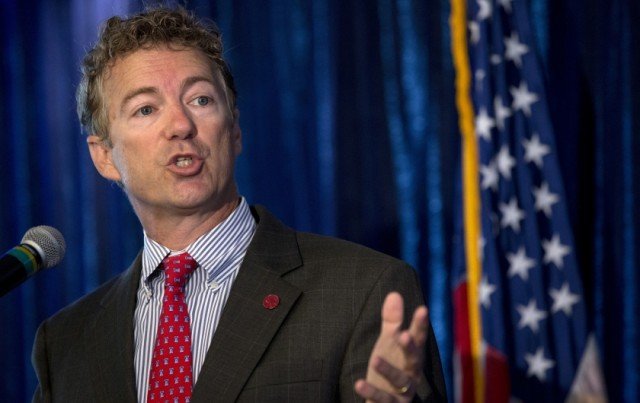
Rand Paul sued the Obama administration over the NSA’s mass collection of millions of Americans’ phone records
President Barack Obama has called for reforms to the program in an effort to regain public trust. Others, like Rand Paul, have called for the end of this kind of surveillance.
Rand Paul dodged a question about his presidential ambitions during a news conference Wednesday. But his lawsuit is the latest effort to propel the debate over the once-secret surveillance program into the 2016 presidential campaign.
The surveillance debate has exposed intra-party tensions for Republicans. The party split on this issue between its leadership, which backs the program on security grounds, and libertarian-minded members who are more wary of government involvement in Americans’ private lives.
The Republican National Committee last month approved a resolution to end the surveillance programs. While some Republicans played down its significance, the nonbinding vote was seen as a nod to Republicans like Rand Paul.
The White House and Justice Department did not comment on the lawsuit specifically, but said they believe the bulk collection of phone records is legal.
[youtube WnJeOZIPM3Q 650]
Director of National Intelligence James Clapper has demanded NSA leaker Edward Snowden return the documents he has “stolen”.
At a Senate hearing, James Clapper harshly condemned Edward Snowden, saying his leaks caused “profound damage”.
James Clapper said the leaks had gone “way beyond [Edward Snowden’s] professed concerns” about domestic spying.
Edward Snowden, 30, remains in Russia on asylum but faces espionage charges in the US.
The documents from the NSA that Edward Snowden has leaked to journalists have shed new light on electronic spying operations in the US and UK.
Among other revelations, the documents showed the NSA collected data on millions of phone calls, collected millions of text messages per day, tapped the mobile phone of German Chancellor Angela Merkel, sought to collect intelligence by spying on users’ mobile apps, and more.
Some of the intelligence was shared with British spies in the Government Communications Headquarters (GCHQ), according to the documents.
Edward Snowden, who was a contract computer technician for the NSA before he fled the US last year, has said he no longer has copies of the documents.
“Snowden claims that he’s won and that his mission is accomplished,” James Clapper told the Senate intelligence committee on Wednesday.
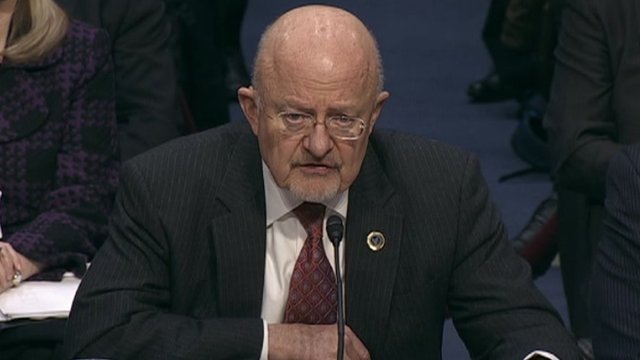
James Clapper has demanded NSA leaker Edward Snowden return the documents he has stolen
“If that is so, I call on him and his accomplices to facilitate the return of the remaining stolen documents that have not yet been exposed to prevent even more damage to US security.”
James Clapper did not clarify whom he meant by “accomplices”, but his spokesman told the Associated Press news agency he “was referring to anyone who is assisting Edward Snowden to further threaten our national security through the unauthorized disclosure of stolen documents related to lawful foreign intelligence collection programs”.
The former NSA contractor has said in recent interviews he believes the leaks have prompted a global reaction and a political debate within the US over spying programs.
But James Clapper said on Wednesday the leaks had damaged US national security and undermined co-operation with the country’s foreign partners.
US enemies “are going to school on US intelligence sources, methods and trade craft and the insights that they are gaining are making our job much, much harder,” he said.
As the hearing opened on Wednesday, protesters heckled James Clapper – one saying: “Should we be asking for James Clapper’s resignation for lying to Congress?”
James Clapper has been criticized for telling legislators during a hearing last year the US did not collect data on millions of Americans, though Edward Snowden’s leak has suggested the NSA had indeed been gathering data on calls of many Americans.
[youtube JVF1rUiwrEg 650]
According to the latest Edward Snowden leaks, the UK intelligence agency , GCHQ, has monitored in real-time YouTube video views, Facebook “likes” and Blogger visits.
Details of an alleged GCHQ program codenamed Squeaky Dolphin have been published by NBC News.
It reports that the agency showed off its abilities to the National Security Agency (NSA) in 2012.
Facebook has since started encrypting its data, but Google’s YouTube and Blogger services remain unencrypted.
Both firms have said that they did not give GCHQ (Government Communications Headquarters) permission to access the data.
The alleged operation’s leaked logo – showing a dolphin holding a canister branded GTE – appears to refer to Global Telecoms Exploitation, a GCHQ division believed to be capable of collecting data from fibre-optic cables.
According to an earlier leak, published by the Guardian, GCHQ has been tapping fibre-optic cables to create a “buffer” of information it could search through since at least 2011, as part of a scheme called Tempora.

GCHQ has monitored in real-time YouTube video views, Facebook “likes” and Blogger visits
The newspaper said that by 2012 the agency had tapped more than 200 cables – including transatlantic communication links – and was able to process phone and internet data taken from up to 46 of them at a time.
GCHQ declined to comment on the specifics of the latest report.
The NBC report is based on a presentation entitled Psychology: A New Kind of Sigdev [signals development]. It was part of the trove of documents former NSA contractor Edward Snowden passed to journalist Glenn Greenwald, who contributed to NBC’s report.
The papers refer to the use of Splunk Dashboard to provide real-time analysis of how people use YouTube, Facebook and Blogger.
Splunk is commercially available software designed to let organisations “listen” to their own data.
Examples that GCHQ is said to have shown off include:
- a table showing how many people based in the city of Lagos looked at a specific job vacancies blog over a 24-hour period
- a graph showing how many London-based internet users “liked” links about former Defense Secretary Liam Fox on Facebook over a week-long period
- a pie chart highlighting 20 trending YouTube video tags a day before planned anti-government protests in Bahrain
Although the examples provided do not identify specific users, NBC suggests this would have been possible to do if GCHQ had access to such data.
A spokesman for Facebook added: “Network security is an important part of the way we protect user information, which is why we finished moving our site traffic to HTTPS [encryption] by default last year, implemented Perfect Forward Secrecy, and continue to strengthen all aspects of our network.”
[youtube gpmA9ujR-cg 650]
Edward Snowden has alleged the National Security Agency (NSA) engaged in industrial espionage.
In an interview with Germany’s ARD TV channel, Edward Snowden said the agency would spy on big German companies that competed with US firms.
The former NSA contractor, who was granted temporary asylum by Russia, also said he believed that US officials wanted to kill him.
Edward Snowden’s leaks caused outrage in Germany when it came to light Chancellor Angela Merkel’s phone had been bugged.
After the row broke out last year, Angela Merkel accused the US of an unacceptable breach of trust.
Last week President Barack Obama indicated to Germany’s ZDF TV that US bugging of Angela Merkel’s mobile phone had been a mistake and would not happen again.

Edward Snowden has alleged the NSA engaged in industrial espionage
Referring to the German engineering company Siemens, Edward Snowden told ARD: “If there is information at Siemens that they [the NSA] think would be beneficial to the national interests, not the national security, of the United States, they will go after that information and they’ll take it.”
Edward Snowden also said he believed US agents want to kill him, referring to an article published by the Buzzfeed website in which intelligence operatives are quoted as saying they want to see him dead.
In August, Russia granted Edward Snowden asylum for one year, after he leaked details of US electronic surveillance programs.
The US has charged Edward Snowden with theft of government property, unauthorized communication of national defense information and willful communication of classified communications intelligence.
[youtube qhKC5Dyiies 650]
[youtube f5S5I4o2MHI 650]
During an online Q&A session, former NSA contractor Edward Snowden has said he has “no chance” of a fair trial in the US and has no plans to return there.
Edward Snowden, 30, said that the 100-year-old law under which he has been charged “forbids a public interest defense”.
“There’s no way I can come home and make my case to a jury,” he said.
Edward Snowden has temporary asylum in Russia after leaking details of NSA electronic surveillance programmes.
He said that his predicament over not having a fair trial was “especially frustrating”.
“Returning to the US, I think, is the best resolution for the government, the public, and myself, but it’s unfortunately not possible in the face of current whistleblower protection laws, which, through a failure in law, did not cover national security contractors like myself,” he told the Free Snowden website.
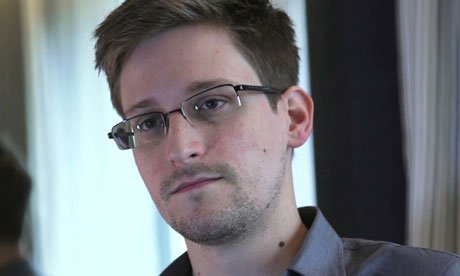
Edward Snowden has said he has “no chance” of a fair trial in the US and has no plans to return there
“Maybe when Congress comes together to end the programs… They’ll reform the Whistleblower Protection Act, and we’ll see a mechanism for all Americans, no matter who they work for, to get a fair trial.”
In December Edward Snowden delivered an “alternative” Christmas message to Britain’s Channel 4 TV, in which he called for an end to mass surveillance.
Earlier on Thursday an independent US privacy watchdog ruled that the bulk collection of phone call data by US intelligence agencies is illegal and has had only “minimal” benefits in preventing terrorism.
The Privacy and Civil Liberties Oversight Board (PCLOB) advised by a 3-2 majority that the program should end.
The report from the PCLOB is the latest of several reviews of the NSA’s mass surveillance program, the details of which caused widespread anger after they were leaked by Edward Snowden.
In a separate development on Thursday, Attorney General Eric Holder told MSNBC television that he was unlikely to consider clemency for Edward Snowden.
Eric Holder said that the US authorities “would engage in conversation” about a resolution of the case if Edward Snowden accepted responsibility for leaking government secrets.
[youtube 1e4D0Z6c76M 650]
During an interview with a German television, President Barack Obama has said he will not let controversial NSA surveillance undermine Washington’s ties with Germany.
Speaking to Germany’s ZDF TV, Barack Obama indicated that US bugging of Chancellor Angela Merkel’s mobile phone had been a mistake and would not happen again.
After the row broke out last year, Angela Merkel accused the US of an unacceptable breach of trust.
On Friday, Barack Obama ordered curbs on how intelligence was being collected.
On Saturday, he told ZDF: “I don’t need and don’t want to harm that (US-German) relationship by a surveillance mechanism that somehow would impede the kind of communication and trust that we have.”
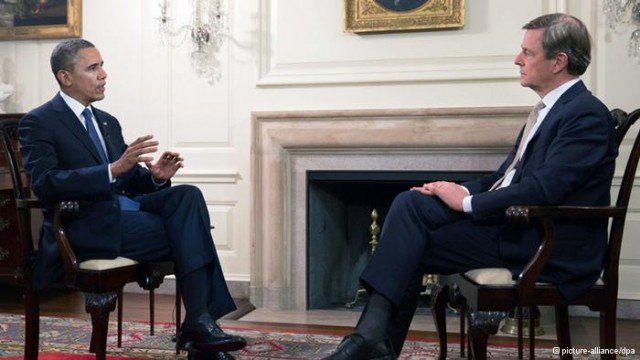
Speaking to Germany’s ZDF TV, Barack Obama indicated that US bugging of Chancellor Angela Merkel’s mobile phone had been a mistake and would not happen again
“As long as I’m president of the United States, the chancellor of Germany will not have to worry about this.”
Barack Obama added the US intelligence services, like all others, would continue to be interested in what world governments’ intentions were.
“There is no point in having an intelligence service if you are restricted to the things that you can read in the New York Times or Der Spiegel,” he said.
“The truth of the matter is that by definition the job of intelligence is to find out: Well, what are folks thinking? What are they doing?”
Barack Obama said he and Chancellor Angela Merkel might not always be of the same opinion but that was not a “reason to wiretap”.
The interview was broadcast a day after Barack Obama ordered restrictions on the use of bulk data collected by US intelligence agencies, saying civil liberties must be respected.
[youtube oT-PMEFg5C8 650]
President Barack Obama has announced he has ordered curbs on the use of bulk data collected by all US intelligence agencies, saying civil liberties must be respected.
Barack Obama said such data had prevented terror attacks at home and abroad, but that in tackling threats the government risked over-reaching itself.
However, civil liberties groups have said the changes do not go far enough.
The announcement follows global anger after details of the work of the National Security Agency were leaked.
Edward Snowden, the former NSA contractor who leaked the information, is wanted in the US for espionage and is now living in exile in Russia.
The leaked documents revealed that the US collects massive amounts of electronic data from communications of private individuals around the world, and that it has spied on foreign leaders.
The latest revelations claim that US agencies have collected and stored almost 200 million text messages every day across the globe.
In his much-anticipated speech at the Department of Justice, Barack Obama said he would not apologize for the effectiveness of US intelligence operations, and insisted that nothing he had seen indicated they had sought to break the law.
It was necessary for the US to continue collecting large amounts of data, he said, but acknowledged that doing so allowed for “the potential of abuse”.
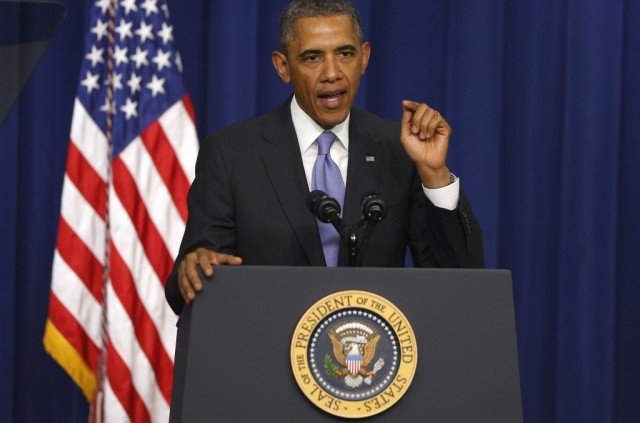
President Barack Obama has ordered curbs on the use of bulk data collected by all US intelligence agencies
“The reforms I’m proposing today should give the American people greater confidence that their rights are being protected, even as our intelligence and law enforcement agencies maintain the tools they need to keep us safe,” he said.
Details of the times, numbers and durations of phone calls – known as metadata – are currently collected and held by the NSA. However, Barack Obama said he was ending that system “as it currently exists”.
He has asked the attorney general and the intelligence community to draw up plans for such metadata to be held by a third party, with the NSA required to seek legal permission before it could access them.
A panel of independent privacy advocates would also sit on the secret Foreign Intelligence Surveillance Court (FISC) which has responsibility for giving permission for mass surveillance programmes.
Barack Obama also offered assurances to non-Americans, saying people around the world “should know that the United States is not spying on ordinary people who don’t threaten our national security”.
“This applies to foreign leaders as well,” he said, promising that from now on the US “will not monitor the communications of heads of state and government of our close friends and allies”.
That announcement follows revelations that the US had spied on friendly foreign leaders, including the personal mobile of German Chancellor Angela Merkel.
Barack Obama was also critical of nations he said “feign surprise” over the leaks but “privately acknowledge that America has special responsibilities as the world’s only superpower” and have used the information gathered for their own purposes.
The president said he would not “dwell on Mr. Snowden’s actions or his motivations”, but warned that the “sensational way” the NSA details had come to light had potentially jeopardized US operations “for years to come”.
Civil liberties groups see Edward Snowden as a hero for exposing what they see as official intrusions into private lives, but many Americans believe he has endangered American lives.
[youtube 6XZLan1VkcY 650]
[youtube p4MKm2uFqVQ 650]
Edward Snowden has delivered an “alternative” UK Christmas message, urging an end to mass surveillance.
The broadcast was carried on Channel 4 as an alternative to Queen Elizabeth’s traditional Christmas message.
Edward Snowden, 30, focused on privacy, saying: “A child born today will grow up with no conception of privacy at all.”
He has temporary asylum in Russia after leaking details of US electronic surveillance programs.

Edward Snowden has delivered an “alternative” UK Christmas message, urging an end to mass surveillance
Edward Snowden opened his two-minute message, recorded in Russia, with a reference to novelist George Orwell, author of 1984, saying the surveillance technology described in his works was “nothing compared to what we have today”.
He said: “A child born today will grow up with no conception of privacy at all. They’ll never know what it means to have a private moment to themselves, an unrecorded, unanalyzed thought.
“The conversation occurring today will determine the amount of trust we can place both in the technology that surrounds us and the government that regulates it.
“Together we can find a better balance, end mass surveillance and remind the government that if it really wants to know how we feel, asking is always cheaper than spying.”
Channel 4’s alternative Christmas message has in the past featured Iran’s then-President Mahmoud Ahmedinejad and fictional characters Ali G and Marge Simpson.
[youtube 8iuLLkWefxs 650]
In a recent interview, Edward Snowden – who leaked details of NSA electronic surveillance programs – says he’s achieved his aim.
“In terms of personal satisfaction, the mission’s already accomplished,” he told the Washington Post.
“I already won,” said 30-year-old Edward Snowden, whose extensive leaks have caused a reassessment of US surveillance policy.
Edward Snowden was interviewed in Russia, where he was granted temporary asylum on August 1st.
The former NSA contractor fled the US in late May, taking a huge cache of secret documents with him. He faces espionage charges in the US.

Edward Snowden was interviewed in Russia, where he was granted temporary asylum
“As soon as the journalists were able to work, everything that I had been trying to do was validated. Because, remember, I didn’t want to change society. I wanted to give society a chance to determine if it should change itself,” Edward Snowden told the newspaper.
“All I wanted was for the public to be able to have a say in how they are governed,” he said.
The NSA, accustomed to watching without being watched, faces scrutiny it has not endured since the 1970s, or perhaps ever, the Washington Post reports.
Edward Snowden told the newspaper he had no way of knowing whether the public would share his views.
“You recognize that you’re going in blind… But when you weigh that against the alternative, which is not to act, you realize that some analysis is better than no analysis.”
[youtube FWwDbN6Av68 650]
Director of National Intelligence James Clapper has decided to declassify more information on the National Security Agency (NSA) spying, showing it started in October 2001
On Saturday, James Clapper declassified more documents that outline how the NSA was first authorized to start collecting bulk phone and Internet records in the hunt for al-Qaeda terrorists and how a court eventually gained oversight of the program.
The declassification came after the Justice Department complied with a federal court order to release its previous legal arguments for keeping the programs secret.
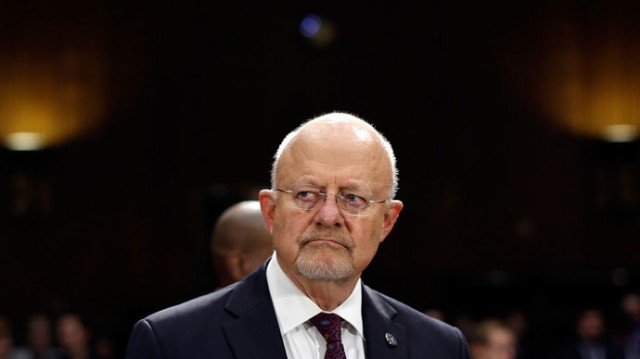
Director of National Intelligence James Clapper showed the NSA spying started in October 2001
James Clapper explained in a statement Saturday that President George W. Bush first authorized the spying in October 2001, as part of the Terrorist Surveillance Program, just after the September 11 attacks. President Bush disclosed the program in 2005. The Terrorist Surveillance Program – which had to be extended every 30-60 days by presidential order – eventually was replaced by the Foreign Intelligence Surveillance Act, a law that requires a secret court to approve the bulk collection.
He also released federal court documents from successive intelligence directors arguing to keep the programs secret, after a California judge this fall ordered the administration to declassify whatever details already had been revealed as part of the White House’s campaign to justify the NSA surveillance.
Former NSA contractor Edward Snowden first made the surveillance programs public in leaks to the media.
[youtube Pf7yNogMtdk 650]
President Barack Obama has suggested at his end-of-year news conference there may be a review of surveillance by the National Security Agency (NSA) in the wake of a series of spying revelations.
Barack Obama said in “light of disclosures that have taken place” and public concerns about the programmes “there may be another way of skinning the cat”.
However, the president said ex-NSA contractor Edward Snowden had caused “unnecessary damage” by leaking documents.
He declined to say whether or not Edward Snowden could be offered an amnesty.
Edward Snowden fled the US in late May, taking a huge cache of secret documents with him. He faces espionage charges in the US and has been granted temporary asylum in Russia.
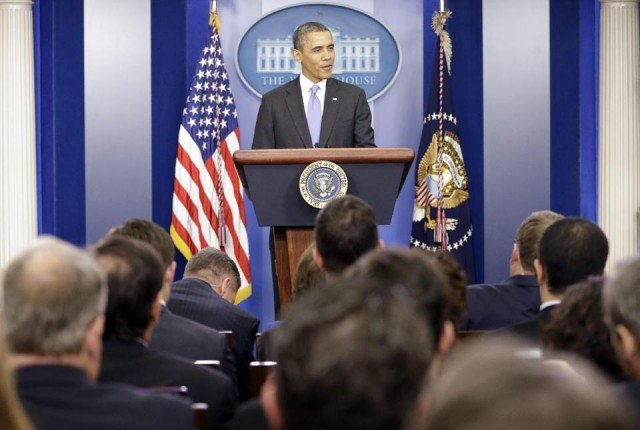
Barack Obama has suggested there may be a review of surveillance by the NSA in the wake of a series of spying revelations
“There are ways we can do it, potentially, that gives people greater assurance that there are checks and balances, that there’s sufficient oversight and sufficient transparency,” Barack Obama said.
He said that programmes like the bulk collection of phone records “could be redesigned in ways that give you the same information when you need it without creating these potentials for abuse”.
Barack Obama said he would make a “definitive statement” in January about recommendations by the White House panel.
“I have confidence in the fact that the NSA is not engaging in domestic surveillance or snooping around,” he added.
“We may have to refine this further to give people more confidence. And I’m going to be working very hard on doing that.”
On the subject of possibly granting Edward Snowden an amnesty, Barack Obama said: “I will leave it up to the courts and the attorney general to weigh in on Mr. Snowden’s case.”
[youtube yDBEUYDU22I 650]
The National Security Agency’s mass collection of telephone data unconstitutional, Federal District Judge Richard Leon has ruled.
Judge Richard Leon said the NSA’s practice was an “arbitrary invasion”.
The agency’s collection of “metadata” including telephone numbers and times and dates of calls was exposed by ex-NSA contractor Edward Snowden.
The White House dismissed the suggestion Edward Snowden receive amnesty if he stopped leaking documents.
In his ruling in a Washington DC federal court on Monday, Richard Leon called the NSA’s surveillance programme “indiscriminate” and an “almost Orwellian technology that enables the government to store and analyze the phone metadata of every telephone user in the United States”.
The ruling came in a lawsuit brought by conservative activist Larry Klayman, a user of a Verizon mobile telephone who challenged the NSA’s collection of metadata on his behalf and that of a client.
The NSA had ordered Verizon – one of the largest phone companies in the US – to disclose to it metadata, including telephone numbers, calling card numbers and the serial numbers of phones, of millions of calls it processes in which at least one party is in the US.
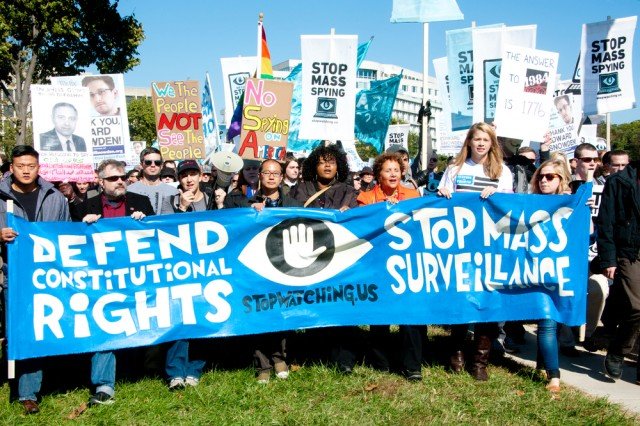
Federal District Judge Richard Leon has ruled the NSA’s mass collection of phone data unconstitutional
Judge Richard Leon ruled the plaintiffs had demonstrated “a substantial likelihood of success on the merits of their Fourth Amendment claim and that they will suffer irreparable harm absent… relief”, referring to the clause in the US constitution that bars unreasonable search and seizure by the government.
He issued a preliminary injunction against the NSA surveillance programme but suspended the order to allow for an appeal by the justice department, thus enabling the programme to continue for now.
Through Glenn Greenwald, the former Guardian journalist with whom he has close ties, Edward Snowden issued a statement hailing the ruling.
“I acted on my belief that the NSA’s mass surveillance programs would not withstand a constitutional challenge, and that the American public deserved a chance to see these issues determined by open courts,” Edward Snowden wrote, according to the New York Times.
“Today, a secret program authorized by a secret court was, when exposed to the light of day, found to violate Americans’ rights,” he added.
“It is the first of many.”
[youtube ucqVSKBn7Ww 650]
The National Security Agency (NSA) is considering offering an amnesty to fugitive intelligence contractor Edward Snowden if he agrees to stop leaking secret documents, an agency’s official says.
The man in charge of assessing the leaks’ damage, Richard Ledgett, said he could be open to an amnesty deal.
Disclosures by the former intelligence worker have revealed the extent of the NSA’s spying activity.
But NSA Director General Keith Alexander has dismissed the idea.
Richard Ledgett spoke to US television channel CBS about the possibility of an amnesty deal: “So my personal view is, yes it’s worth having a conversation about.
“I would need assurances that the remainder of the data could be secured, and my bar for those assurances would be very high, would be more than just an assertion on his part.”
But Gen. Keith Alexander, who is retiring early next year, rejected the idea of any amnesty for Edward Snowden.
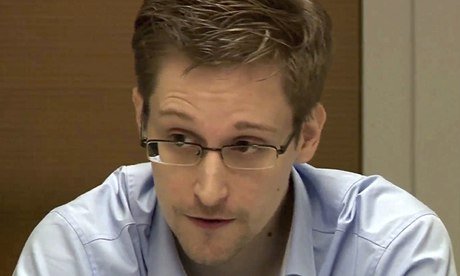
The NSA is considering offering an amnesty to Edward Snowden if he agrees to stop leaking secret documents
“This is analogous to a hostage taker taking 50 people hostage, shooting 10, and then say, <<if you give me full amnesty, I’ll let the other 40 go>>. What do you do?”
In an earlier interview with the Reuters news agency, Richard Ledgett said he was deeply worried about highly classified documents not yet public that are among the 1.7 million files Edward Snowden is believed to have accessed.
Edward Snowden’s disclosures have been “cataclysmic” for the agency, Richard Ledgett told Reuters.
Earlier this month, The Guardian’s editor told UK MPs only 1% of files leaked by Edward Snowden had been published by the newspaper.
The state department says its position has not changed and that Edward Snowden must return to the US to face charges.
The US has charged Edward Snowden with theft of government property, unauthorized communication of national defense information and willful communication of classified communications intelligence.
Each of the charges carries a maximum 10-year prison sentence.
At the weekend, the NSA allowed a CBS television crew into their headquarters for the first time in its history, in an effort to be more open about what the agency does with the data it collects.
[youtube Yt_SdCRgpIo 650]
Apple has revealed a list of data requests it has received from governments across the globe.
The US government tops the list with 1,000 to 2,000 requests in the six months to June 30.
Apple said the US requests affected 2,000 to 3,000 accounts, adding it gave out data on zero to 1,000 accounts.
The tech giant said the most common “requests involve robberies and other crimes or requests from law enforcement officers searching for missing persons”.
It said the response usually involves disclosing information about an account holder’s iTunes or iCloud account “such as a name and an address”.
“In very rare cases, we are asked to provide stored photos or email. We consider these requests very carefully and only provide account content in extremely limited circumstances,” Apple said.
The UK was second on the list, with 127 requests. Spain, Germany and Australia also featured in the top five.

Apple has revealed a list of data requests it has received from governments across the globe
Apple added that since its main business was “not about collecting information”, the vast majority of requests it received from law enforcement agencies were about information on “lost or stolen devices”.
The company logs these requests under a separate category as “device requests” which, it said, “never include national security-related requests”.
Apple received more than 3,500 such requests in the US between January and June this year.
The tech giant also used the report to call for more freedom to disclose the details of such requests to customers.
Apple said that currently the US government did not allow it to disclose “except in broad ranges, the number of national security orders, the number of accounts affected by the orders, or whether content, such as emails, was disclosed”.
“We strongly oppose this gag order,” it added.
Apple said it had asked the government to ease these restrictions but so far had not seen any major changes.
“Despite our extensive efforts in this area, we do not yet have an agreement that we feel adequately addresses our customers’ right to know how often and under what circumstances we provide data to law enforcement agencies.”
The move by tech companies came after leaks by whistleblower Edward Snowden revealed mass surveillance programmes by the National Security Agency (NSA) and associated agencies.
Apple said it had filed a letter with the Foreign Intelligence Surveillance Court supporting a group of cases requesting greater transparency.
The US Congress and the White House have rejected clemency for former NSA analyst Edward Snowden.
“Mr. Snowden violated US law. He should return to the US and face justice,” said White House adviser Dan Pfeiffer.
Edward Snowden, 30, asked for international help to persuade the US to drop spying charges against him in a letter given to a German politician.
He fled to Russia in June after leaking details of far-reaching US telephone and internet espionage.
Edward Snowden was granted temporary asylum, allowing him to live in Russia until July 2014.
In a surprise move last week, German Green MP Hans-Christian Stroebele met Edward Snowden in Moscow and revealed the former intelligence contractor’s readiness to brief the German government on NSA’s spying.
Edward Snowden set out his position in a letter, which Hans-Christian Stroebele showed to reporters at a news conference in Berlin on Friday.
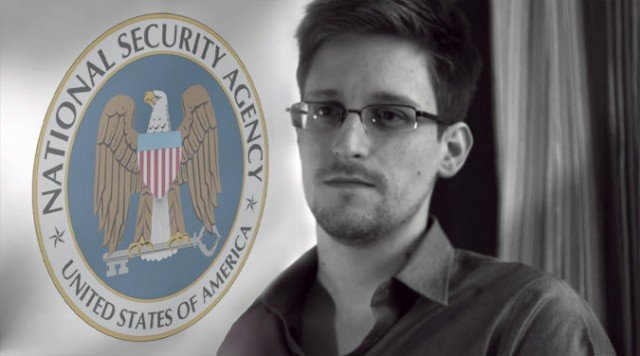
The US Congress and the White House have rejected clemency for former NSA analyst Edward Snowden
“Speaking the truth is not a crime,” Edward Snowden wrote. He claimed that the US government was persecuting him by charging him with espionage.
On Sunday, the White House said that no offers for clemency were being discussed.
This view was echoed by the Republican Congressman Mike Rogers and Democratic senator Dianne Feinstein.
Dianne Feinstein said that if Edward Snowden had been a true whistleblower, he could have reported privately to her committee, but had chosen not to.
“We would have seen him and we would have looked at that information. That didn’t happen, and now he’s done this enormous disservice to our country,” Senator Dianne Feinstein said in an interview on CBS television.
“I think the answer is no clemency,” she said.
The scale of the alleged US espionage has provoked international concern and calls for tighter supervision.
Reports that the US bugged German Chancellor Angela Merkel’s mobile phone for years have caused a diplomatic rift.
The head of US intelligence has defended the monitoring of foreign leaders as a key goal of operations but the US is facing growing anger over reports it spied on its allies abroad.
It has also been reported that the NSA monitored French diplomats in Washington and at the UN, and that it conducted surveillance on millions of French and Spanish telephone calls, among other operations against US allies.
[youtube 4LKz2XwsUSY 650]
Brazil and Germany have asked the UN General Assembly to adopt a draft resolution calling for the right to privacy in the digital age.
The draft calls for an end to excessive electronic surveillance, noting that the illegal collection of personal data “constitutes a highly intrusive act”.
Brazil and Germany have both been angered by allegations of large-scale US surveillance.
The allegations stem from revelations by NSA whistleblower Edward Snowden.
The draft resolution, which does not name individual countries, will be debated by a General Assembly committee focusing on human rights.
The draft calls on the 193-member assembly to declare that it is “deeply concerned at human rights violations and abuses that may result from the conduct of any surveillance of communications”.
This includes “extraterritorial surveillance of communications, their interception, as well as the collection of personal data, in particular massive surveillance, interception and data collection”.
The resolution, which will be voted on later this month, calls on all countries to protect the right to privacy guaranteed under international law.

The UN draft resolution follows allegations that the US has been eavesdropping on foreign leaders, including Brazilian President Dilma Rousseff and German Chancellor Angela Merkel
While General Assembly resolutions are non-binding, they can carry significant moral and political weight if they win enough support.
The draft follows allegations that the US has been eavesdropping on foreign leaders, including Brazilian President Dilma Rousseff and German Chancellor Angela Merkel, angering US allies in Europe and Asia.
Disclosures about the extent of US spying activity came from documents leaked to media organizations by Edward Snowden.
Angela Merkel’s anxiety about US spying overshadowed last week’s EU summit, when she remarked with irritation that spying on friends is “really not on”.
Dilma Rousseff was angered by revelations that the NSA had hacked the computer network of Brazil’s state-run oil company Petrobras to collect data on emails and telephone calls.
[youtube f3hPQGCO-eE 650]
German intelligence officials are in Washington for talks at the White House on Wednesday following claims that the US monitored Chancellor Angela Merkel’s mobile phone.
Angela Merkel’s foreign policy adviser and Germany’s intelligence co-ordinator will hold talks at the White House.
The head of US intelligence has defended the monitoring of foreign leaders as a key goal of operations.
The US is facing growing anger over reports it spied on its allies abroad.
It has also been reported that the NSA monitored French diplomats in Washington and at the UN, and that it conducted surveillance on millions of French and Spanish telephone calls, among other operations against US allies.

German intelligence officials are in Washington for talks at the White House following claims that the US monitored Chancellor Angela Merkel’s mobile phone
However, NSA director General Keith Alexander said “the assertions… that NSA collected tens of millions of phone calls are completely false”.
The revelations stem from documents leaked by fugitive ex-US intelligence contractor Edward Snowden, who now lives in Russia and is wanted in the US in connection with the unauthorised disclosures.
German media have reported that the US bugged Chancellor Angela Merkel’s phone for more than a decade – and that the surveillance only ended a few months ago.
Germany’s delegation includes Christoph Heusgen, Angela Merkel’s foreign policy adviser, and Guenter Heiss, the secret service co-ordinator, said Caitlin Hayden, a spokeswoman for the US National Security Council.
US National Security Adviser Susan Rice, Director of National Intelligence James Clapper and Lisa Monaco, assistant to the president for homeland security and counterterrorism, are also expected to take part.
Caitlin Hayden said the meeting was part of the agreement reached between President Barack Obama and Chancellor Angela Merkel last week to deepen US-German cooperation on intelligence matters.
The meeting comes just hours after James Clapper and Gen. Keith Alexander testified before the intelligence panel of the House of Representatives on Tuesday.
Gen. Keith Alexander said much of the data cited by non-US news outlets was actually collected by European intelligence services and later shared with the NSA.
[youtube JDDIESu-6G4 650]
Director of National Intelligence James Clapper has told a House committee that discerning foreign leaders’ intentions is a key goal of US spying operations.
James Clapper described such efforts as a “top tenet” of US intelligence policy.
However, he told the House intelligence panel the US did not “indiscriminately” spy on other nations.
James Clapper was reacting to a growing international row over reports the US eavesdropped on foreign allies.
“Leadership intentions is kind of a basic tenet of what we collect and analyze,” he said, adding that foreign allies spy on US officials and intelligence agencies as a matter of routine.
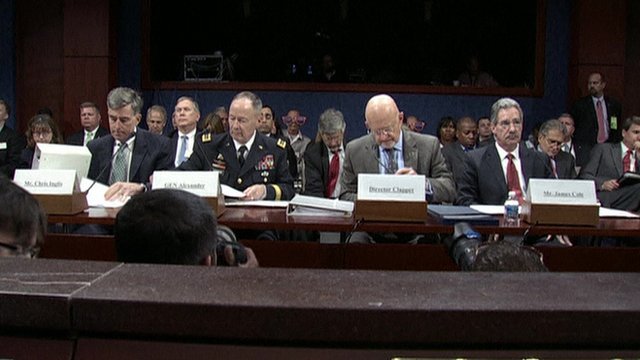
James Clapper has told a House committee that discerning foreign leaders’ intentions is a key goal of US spying operations
Also testifying before the House intelligence committee on Tuesday was NSA Director General Keith Alexander, who called media reports in France, Spain and Italy that the NSA collected millions of telephone calls “completely false”.
The information “that lead people to believe that the NSA or United States collected that information is false, and it’s false that it was collected on European citizens,” he added.
“It was neither.”
Tuesday’s hearing followed calls by US Senate intelligence committee chairwoman Dianne Feinstein to end eavesdropping on leaders of the nation’s allies.
Dianne Feinstein said the White House had told her such surveillance would stop.
President Barack Obama has faced significant criticism over reports he was unaware of the extent of the spying.
The White House has admitted the need for additional “constraints” on US intelligence gathering, amid claims of eavesdropping on allies.
President Barack Obama’s spokesman, Jay Carney, said an ongoing White House intelligence policy review would account for “privacy concerns”.
Spain is the latest of several countries reported to have been the target of US collection of phone data.
A top Democrat in the Senate has said its intelligence panel will undertake a “major review” of US spying programmes.
Senator Dianne Feinstein said she was “totally opposed” to the NSA’s intelligence gathering on leaders of US allies.
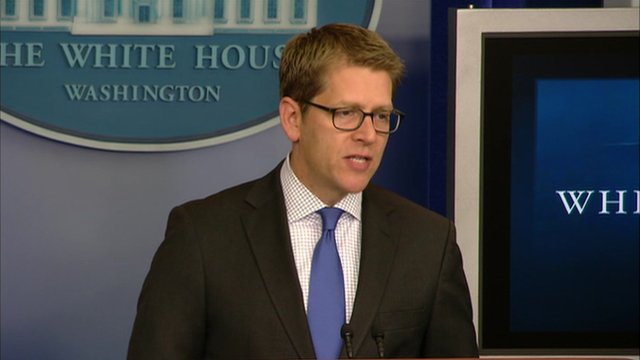
White House spokesman Jay Carney said an ongoing White House intelligence policy review would account for privacy concerns
An EU delegate in Washington described the row as “a breakdown of trust”.
On Monday Jay Carney told reporters the administration “recognize[s] there needs to be additional constraints on how we gather and use intelligence”.
He said the US did not use its intelligence gathering capabilities for the purpose of promoting its economic interests, and that Barack Obama was committed to ensuring “that we are collecting information not just because we can, but because we should, because we need it for our security”.
“We also need to ensure that our intelligence resources are most effectively supporting our foreign policy and national security objectives, that we are more effectively weighing the risks and rewards of our activities,” he said.
An across-the-board review of US intelligence resources, currently under way, is also expected to assist the administration in “properly accounting for both the security of our citizens and our allies and the privacy concerns shared by Americans and citizens around the world”, Jay Carney added.
Jay Carney or Barack Obama have not commented on specific allegations that the US eavesdropped on international allies, including tapping the phones of foreign officials.
[youtube 3gDbAPpdnWs 650]
Spain has demanded the US to give details of any eavesdropping, amid reports it monitored 60 million Spanish telephone calls in a month.
The US ambassador to Spain, who had been summoned by its EU minister, vowed to clear the “doubts” that had arisen about his country’s alleged espionage.
Spanish Minister for European Affairs Inigo Mendez de Vigo said such practices, if true, were “inappropriate and unacceptable”.
An EU delegate in Washington said there had been “a breakdown of trust”.
Representatives from the European Parliament’s Committee on Civil Liberties, Justice and Home Affairs spoke to members of the US Congress about the alleged US spying on European leaders and citizens.
German Chancellor Angela Merkel is also sending intelligence officials to Washington to demand answers to claims that her phones were tapped for a decade.

Spain has demanded the US to give details of any eavesdropping, amid reports it monitored 60 million Spanish telephone calls in a month
German media reported that the US had bugged Angela Merkel’s phone for more than a decade – and that the surveillance only ended a few months ago.
The German government hoped that trust between the two countries could be restored, a spokesman told a news conference in Berlin.
The latest allegation, published by Spain’s El Mundo newspaper, is that the NSA tracked tens of millions of phone calls, texts and emails of Spanish citizens, in December 2012 and January 2013. The monitoring allegedly peaked on December 11.
The White House has so far declined to comment on the El Mundo report.
It is not clear how the alleged surveillance was carried out, whether it was through monitoring fibre-optic cables, data obtained from telecommunication companies, or other means.
The NSA is reported to have collected the sender and recipient addresses of emails, along with their IP addresses, the message file size, and sometimes the top or subject line of the message.
For each telephone call, the numbers of the caller and recipient are believed to have been logged, as was its duration, time, date and location.
The contents of the telephone call itself, however, were not monitored, US intelligence officials say. The NSA has also suggested it does not usually store the geolocational information of mobile phone calls, which could determined by noting which mobile signal towers were used.
[youtube K58q7sunxtM 650]
According to Spanish media, the NSA secretly monitored 60 million phone calls in Spain in one month.
The reports say the latest allegations came from documents provided by forer NSA analyst Edward Snowden.
They say the NSA collected the numbers and locations of the caller and the recipient, but not the calls’ content.
This comes as a EU parliamentary delegation prepares for a series of meetings in Washington.
The officials from the European parliament’s Civil Liberties Committee will speak to members of Congress to convey concerns and gather information.
Meanwhile a Japanese news agency says that the NSA asked the Japan’s government in 2011 to help it monitor fibre-optic cables carrying personal data through Japan, to the Asia-Pacific region.
The reports, carried by the Kyodo news agency, say that this was intended to allow the US to spy on China – but Japan refused, citing legal restrictions and a shortage of personnel.
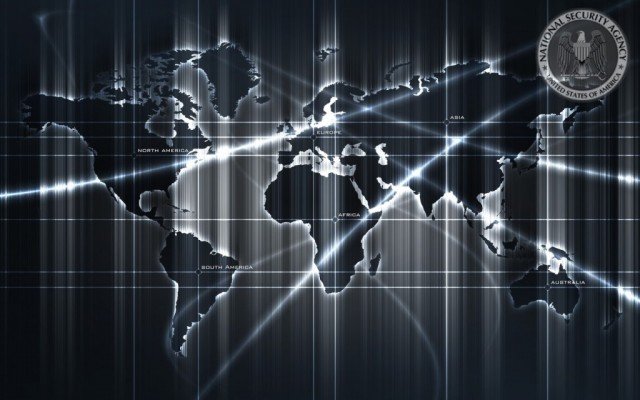
The NSA secretly monitored 60 million phone calls in Spain in one month
The White House has so far declined to comment on Monday’s claims about US spying in Spain, published in the newspapers El Pais and El Mundo.
It is alleged that the NSA tracked millions of phone calls, texts and emails from Spanish citizens between December 10 2012 and January 8, 2013.
The US ambassador to Madrid has been summoned to meet a Spanish foreign ministry official later on Monday to discuss earlier allegations about US spying on Spanish citizens and politicians.
It follows German media reports that the US was bugging Chancellor Angela Merkel’s phone for more than a decade – and that the surveillance only ended a few months ago.
Angela Merkel is sending her country’s top intelligence chiefs to Washington this week to “push forward” an investigation into the spying allegations, which have caused outrage in Germany.
Britain’s Guardian newspaper reported on Friday that the NSA had monitored the phones of 35 world leaders. Again Edward Snowden was the source of the report.
[youtube fIqRb9-xIh8 650]
According to a report in German newspaper Der Spiegel, the US has been spying on Chancellor Angela Merkel’s mobile phone since 2002.
Der Spiegel claims to have seen secret documents from the National Security Agency (NSA) which show Angela Merkel’s number on a list dating from 2002 – before she became chancellor.
Angela Merkel’s number was still on a surveillance list in 2013.
Meanwhile Washington has seen a protest against the NSA’s spying programme.
Several thousand protesters marched to the US Capitol to demand a limit to the surveillance. Some of them held banners in support of the fugitive former contractor Edward Snowden, who revealed the extent of the NSA’s activities.
The nature of the monitoring of Angela Merkel’s mobile phone is not clear from the files, Der Spiegel says.

The US has been spying on Chancellor Angela Merkel’s mobile phone since 2002
For example, it is possible that the chancellor’s conversations were recorded, or that her contacts were simply assessed.
Germany is sending its top intelligence chiefs to Washington in the coming week to “push forward” an investigation into the spying allegations, which have caused outrage in Germany.
On Friday, Germany and France said they want the US to sign a no-spy deal by the end of the year.
As well as the bugging of Angela Merkel’s phone, there are claims the NSA has monitored millions of telephone calls made by German and French citizens.
The documents seen by Der Spiegel give further details of the NSA’s targeting of European governments.
A unit called Special Collection Services, based in the US embassy in Pariser Platz in Berlin, was responsible for monitoring communications in the German capital’s government quarter.
If the existence of listening stations in US embassies were known, there would be “severe damage for the US’s relations with a foreign government,” the documents said.
Similar units were based in around 80 locations worldwide, according to the documents seen by Der Spiegel, 19 of them in European cities.
The US government had a second German spy base in Frankfurt am Main, the magazine reports.
Angela Merkel phoned President Barack Obama when she first heard of the spying allegations on Wednesday.
Barack Obama promised Angela Merkel he knew nothing of the alleged phone monitoring, the magazine reports. The president apologized to the German chancellor, it said.
Angela Merkel – an Americophile who was awarded the US Presidential Medal of Freedom in 2011 – is said to be shocked that Washington may have engaged in the sort of spying she had to endure growing up in Communist East Germany.
[youtube GC-YPXXNMVU 650]
Germany is planning to send its top intelligence chiefs to Washington to “push forward” an investigation into allegations the US spied on Chancellor Angela Merkel.
The heads of German foreign and domestic intelligence would hold talks with the White House and the National Security Agency (NSA), a government spokesperson said.
Earlier, Germany and France said they want the US to sign a no-spy deal by the end of the year.
EU leaders at a Brussels summit have warned a lack of trust could harm the fight against terrorism.
As well as the bugging of Angela Merkel’s phone, there are claims the NSA has monitored millions of telephone calls by both German and French citizens.
Spain on Friday followed Germany and France in summoning the US ambassador to explain reports of spying on the country. Italy has also expressed anger at reports it too has been spied on.
US state department spokesperson Jen Psaki acknowledged that the revelations – most of them sourced to former NSA worker Edward Snowden – have “posed a moment of tension with some of our allies”.
“We are having discussions with those allies, those will continue, as is evidenced by the German delegation that will be coming here in the coming weeks,” she said.
Jen Psaki also said a review of US intelligence gathering, called for by President Barack Obama, would look at how it affects foreign policy.
The “high level group of outside experts… will consider as part of this how we can maintain the public’s trust, how the surveillance impacts our foreign policy, particularly in an age when more and more information is becoming public,” she said.
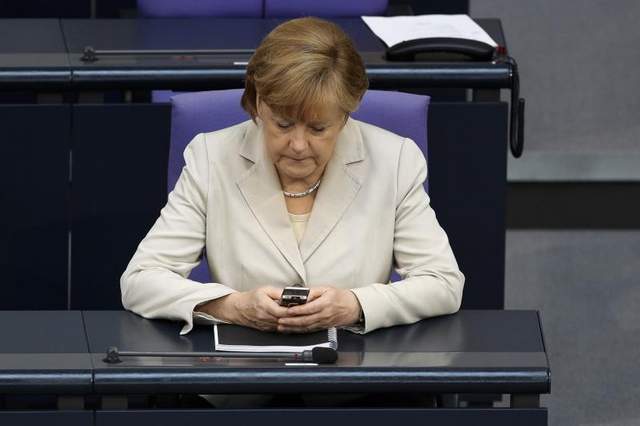
Germany will send its top intelligence chiefs to Washington to “push forward” an investigation into allegations the US spied on Angela Merkel
On Friday, the NSA website itself was inaccessible for several hours, with numerous hacking groups claiming credit for the service outage.
The issue was later put down to “an internal error that occurred during a scheduled update”, NSA spokeswoman Vanee Vines said.
“Claims that the outage was caused by a distributed denial of service attack are not true.”
German government spokesman Georg Streiter did not give a date for the intelligence chiefs’ trip to Washington but said it was being arranged with “relatively short notice”.
“What exactly is going to be regulated, how and in what form it will be negotiated and by whom, I cannot tell you right now,” Georg Streier told reporters.
“But you will learn about it in the near future because we have created some pressure to do this speedily.”
Angela Merkel made clear her anger at the allegations, which emerged in the German media, when she arrived in Brussels on Thursday for the EU summit.
The German chancellor told reporters after the first day that “once the seeds of mistrust have been shown it doesn’t facilitate our co-operation… it makes it more difficult”.
Angela Merkel said they would be pressing for a “joint understanding by the end of the year for the co-operation of the (intelligence) agencies between Germany and the US, and France and the US, to create a framework for the co-operation”.
At a news conference on Friday Angela Merkel said both Berlin and Paris would, separately, be pressing Washington for a deal that is “clear-cut, in line with the spirit of an alliance”.
French President Francois Hollande said the aim of the initiative “is about knowing about the past and setting a framework for the future and putting an end to monitoring mechanisms that are not controlled”.
Observers say they may be seeking an arrangement similar to the “Five Eyes” intelligence-sharing agreement the US has had with Britain, Australia, New Zealand and Canada since just after World War II.
A statement from EU leaders on Friday said the recent intelligence issues had raised “deep concerns” among European citizens.
The leaders “underlined the close relationship between Europe and the USA and the value of that partnership,” and “stressed that intelligence-gathering is a vital element in the fight against terrorism.”
But, the statement went on: “A lack of trust could prejudice the necessary cooperation in the field of intelligence-gathering.”
There are reports that the NSA has monitored the phones of 35 world leaders.
[youtube tAT3bUdwkJc 650]
[youtube kdhla03VGn8 650]

























